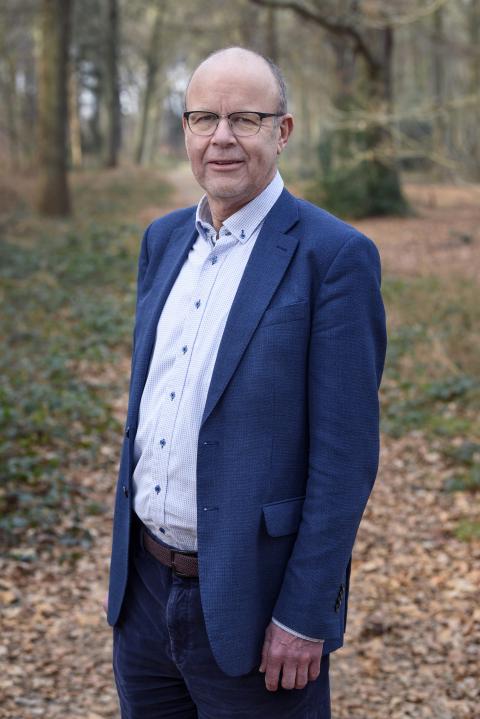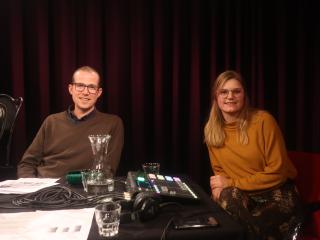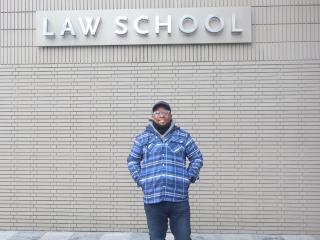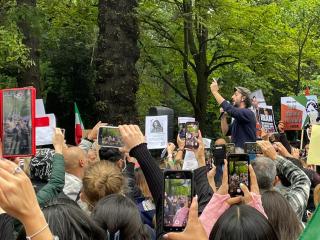‘The new economy is collaborationology’
Professor Lans Bovenberg is renowned as an exceptionally innovative and authoritative economist. After 33 years, he will take his leave from Tilburg University. As the years have gone by, he has, by his own account, become milder. He has evolved into a determined optimist who expects real change to come not so much from financial incentives as from motivated citizens. The economy of the future will be all about a new way of working together, the soon-to-be professor emeritus believes.
The perky greyhound pup that excitedly greets visitors at Lans Bovenberg’s front door fits his new stage in life, one that comes with more freedom and more time for activities that had been on the back burner because of work. Walking the dog of course, but also keeping up with friends, and speaking in his community of faith. And he will remain committed to the university; to his mind, his farewell address on March 10 is more like an interim report. He will have little time to smell the roses, which is hardly surprising for someone who is known for advocating an active lifestyle for senior citizens. In the years ahead, Bovenberg’s main project will be what he calls his Great Mission: economic curriculum reform at Dutch secondary schools.

People are not just rationally calculating consumers who want to take as much as they can
Professor of Economics Lans Bovenberg
What should be done?
‘We can do better and make it more inspiring. The current curriculum is about three decades behind science and society: sustainability and ethical issues dominate the headlines, but what’s on the agenda in classrooms? Mainly market orientation and homo economicus. But people are not just rationally calculating consumers who want to take as much as they can. They are also citizens who are willing to give, to take responsibility, and to matter to others. Economic science turned that page a long time ago; it’s high time education did, too.’
You talk about ‘the big story’ the secondary school economics curriculum should be telling. What is that story?
‘That story is about creating value by working together to achieve prosperity as well as happiness. This is not a complete break with the past, because market mechanisms are also forms of collaboration, and they have given us much; if someone from the Middle Ages could see today’s western civilization, they would be amazed by our astonishing prosperity. But that prosperity has upset the balance on earth, and we can only restore it by working together in a new way. That requires effort. I see the new economy as collaborationology, with traditional economics working in tandem with other social sciences like sociology and psychology to resolve collaboration issues.’
Many enterprises see sustainability as a core task; it’s become a matter for the boss
In 2003, you were awarded the Spinoza Prize for a model the government can use to tax environmental damage. Has your view on the role of the government regarding the environment and climate change changed?
‘It is now the government that is lagging behind. Citizens and companies are making great strides. Climate awareness has increased tremendously, and many enterprises see sustainability as a core task; it’s become a matter for the boss. It is my hope that citizens will take sustainability to the next level because that will give the government the freedom it needs to do the things that must be done, which in turn will give the market a boost. I believe we’ve moved on from doomsday scenario reports about the world coming to an end through climate change. I see it as our moral duty to concentrate on things that go well. The “it’s all hopeless” story doesn’t inspire. Fear is exhausting, hope energizes. Martin Luther King, whom I greatly admire, didn’t say “I have a nightmare” but “I have a dream”.’
You have also made your mark on the Dutch pension system and, more broadly, on thinking about life as a course consisting of different stages. What has changed and what are your hopes?
‘The new Pension Act that awaits deliberation by the Senate reduces intergenerational clashes of interest. The revised system is based on fair arrangements about the potential benefits as well as risks of investments. That has always been one of my ambitions. This, too, is a form of better cooperation, between generations. More generally, I think we now expect more from senior citizens than we did some decades ago: work longer to unburden other generations and once retired use the many years they remain in good health to do more than just “enjoy”. Senior citizens today keep busier, educate themselves, take care of one another or of their grandchildren. I see that as a good thing. A concern I have is that the rush-hour generation faces a new challenge, partly because many more women do paid work: they shoulder a tremendous burden in roughly their fourth decade, having to raise children and be at the peak of their careers at the same time. Tenure tracks at the university are a marked example. I hope that we will continue to look for new career patterns, allowing people to reach the top after they’re forty.’
That might also be a stage in life: as we grow older, we become milder
You have always been open about faith being important in your life. What was it like for you as a Protestant to work for 33 years at a university inspired by the Roman Catholic tradition?
‘Wonderful, actually! I have always felt at home in Tilburg. That’s partly because Christians have now become a minority in society; we prefer to embrace rather than oppose each other. And over the years I have begun to feel more Catholic. Protestants – as the name suggests – protest quite a bit. They look at what’s wrong in the world, and I was raised on that view: people incline towards evil. I take a different view now. That might also be a stage in life: as we grow older, we become milder. I now pay more attention to what is good and community-minded in people. I might just be one of the most Catholic Protestants.’
Date of publication: 10 March 2023



